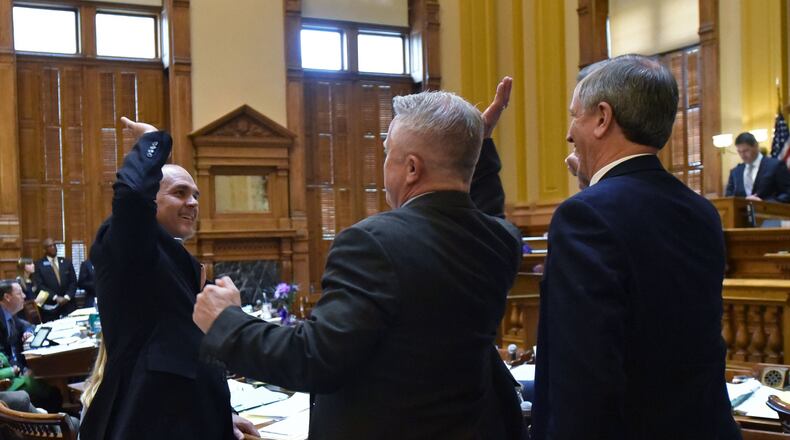Georgia lawmakers are favoring school choice, safety, dyslexia screening and mandatory recess as they consider education-related bills during this year’s legislative session.
Monday will mark the 30th day of the 40-day session, and Thursday was the deadline to move bills from the Senate to the House and vice versa. But legislation that failed to “cross over,” including a controversial proposal to pay for private schooling with money now allocated to public schools, can still rise from the dead by riding on other education-related bills before the session ends on April 2.
School choice
In a narrow vote Tuesday that saw a handful of GOP senators defecting to the Democrat bloc, Senate Bill 173 was defeated. It would have redirected money — perhaps $50 million in the first year rising, potentially, to more than half a billion dollars in a decade — from public schools to family educational costs, including tuition at private schools.
The Senate did approve other "school choice" legislation by sending Senate Bill 163 to the House of Representatives Thursday. The "Tim Tebow Act," named after the football player, would let "home-schooled" students play on their local school's athletic teams and participate in other extracurricular activities now restricted to enrolled students. Also on Thursday, House Bill 530, increasing scrutiny of parents who withdraw their children for home schooling, passed the House. It comes after two children were found buried in their family's backyard in Effingham County in December.
Dyslexia
In February, Senate Bill 48, a mandate that elementary schools screen for dyslexia, crossed to the House. Proponents say the reading disability often goes undiagnosed and untreated. Critics were hard to find: The bill passed the Senate 55-0. The mandate would be contingent upon state funding. The bill also seeks to train teachers.
Curriculum
A few bills addressing classroom content crossed over to the House Thursday. Senate Bill 83 expands on the elective courses allowed on the history and literature of the Bible. Senate Bill 108 requires computer science courses in middle and high school. And Senate Bill 219 requires a 60 percent score on the U.S. citizenship civics test to graduate.
Dual enrollment
The runaway popularity, and spiraling cost, of a program that lets high school students earn college credit for free, pushed House Bill 444 to the Senate Thursday. The legislation makes younger high school students ineligible and taps HOPE scholarship allotments for those exceeding 30 credit hours.
School breaks
One threatened proposal, forcing school districts to schedule breaks on a more consistent, statewide schedule, barely made it out of the gate. Currently, district leaders set their calendars independently, per local needs, to the consternation of the tourism industry. A Senate commission studied the issue this summer, with the help of members from the industry. Yet no senator followed up with a bill. The other chamber devised House Bill 421, but it never exited the committee process.
Health and safety
Amid concerns about school shootings, Senate Bill 15 crossed to the House in February. It requires threat assessments, drills and other precautions. And because House Bill 83 was amended to make it a health and safety requirement, school districts with "flexibility" contracts (all but two in the state) cannot waive its proposed mandate for daily recess in elementary school. It's too soon for children to break out their party juice boxes after the bill hopped to the Senate Thursday: The same legislation has failed the past two years.
One bill encountered no resistance, and was rushed to the desk of Gov. Brian Kemp with remarkable speed. Lawmakers feared some child might die before they could get Senate Bill 25 on the books. It undid a change from last year that caused confusion about when drivers must stop for a school bus. It took effect immediately upon receiving Kemp's signature, on Feb. 15.
About the Author
Keep Reading
The Latest
Featured


